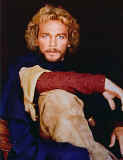In the presence of King Richard, Henry
Bolingbroke (Richard's cousin and John Gaunt's son)
accuses Mowbray, Duke of Norfork, of misusing royal funds
and plotting another royal's death. Mowbray retorts by
calling Bolingbroke a traitor. A trial by combat is
arranged, but as it begins Richard stops it and banishes
both men from England. Richard is about to set off to
quell an Irish rebellion when he is called to the dying
Gaunt's bedside.
When Gaunt dies, Richard seizes all his properties --
despite the protests of Edmund, the Duke of York, that
they rightfully belong to the exiled Bolingbroke. Richard
ignores Edmund's warnings and impudently leaves for
Ireland. Soon afterward, it is revealed that Bolingbroke,
who himself has a large following in England, has set
sail for his homeland.
 The Queen receives news that he's arrived and has already
been joined by the Earl of Northumberland, his son Henry
Percy, Lord Ross and Lord Willoughby. Upset by this news,
Edmund (regent in Richard's absence) leaves for Berkeley
Castle in Gloucester-shire. There, Bolingbroke explains
to York, who has insufficient power to withstand him,
that he's come to claim his inheritance. Richard's
troops, fearing the King dead in Ireland, disband.
The Queen receives news that he's arrived and has already
been joined by the Earl of Northumberland, his son Henry
Percy, Lord Ross and Lord Willoughby. Upset by this news,
Edmund (regent in Richard's absence) leaves for Berkeley
Castle in Gloucester-shire. There, Bolingbroke explains
to York, who has insufficient power to withstand him,
that he's come to claim his inheritance. Richard's
troops, fearing the King dead in Ireland, disband.
It is at Bristol that Bolingbroke starts to explore his
power even as Richard lands in Wales. Richard, certain
that the upstart Bolingbroke will be suppressed, soon
learns from Earl of Salisbury and Sir Stephen Scroop that
his own men have deserted him. In despair, Richard seeks
refuge in Flint Castle, where Bolingbroke finds him and
promises to disperse his forces if Richard revokes his
banishment and restores his Lancastrian lands. Richard,
lamenting his loss of royal authority, agrees.
Despite the Cardinal's protests that no mere man can
judge a king, Bolingbroke insists on this -- then ascends
the throne himself. Richard gives up the insignia of
state to Bolingbroke, and then, distraught, Richard is
taken to the Tower of London. Because usurpation of a
birthright inheritance is seen as a crime, traitorous and
obscene, the Bishop of Carlisle, the Abbot of
Westminster, and Aumerle now plot to kill Bolingbroke.
Faithful to the new King, the Duke of York -- who's
discovered his son Aumerle is involved in this plot --
leaves for Windsor to warn Bolingbroke; however, Aumerle
arrives first and asks for pardon. Aumerle is pardoned,
but not the Bishop and the Abbot.
In the Tower, Sir Pierce of Exton -- believing
Bolingbroke wants Richard dead -- and finding him
imprisoned, murders Richard. Bolingbroke, now Henry IV,
usually rewards the executioners of his opponents. Only
Exton is repudiated by Henry, who realizes he cannot love
or reward Richard's murderer. Even more, to expiate for
this tragedy, King Henry determines to make a pilgrimage
to the Holy Land. Synopsized from Richard II play
program.

